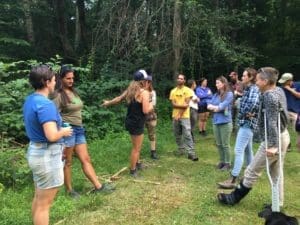Tiverton, RI is not what would be considered a typical agricultural community. The town is situated on the Sakonnet River between the city and the sea, and is relatively densely populated. There are some farms, and lots of good soil and beautiful land, but much of the area is developed in smaller, mostly residential parcels. In Rhode Island, agriculture is often mixed into landscapes with other uses because of the population density here. It is not uncommon to find farms on streets with non-farm families as neighbors.
The Young Farmer Network (YFN) of Southeastern New England is a group that organizes social and educational opportunities for farmers of all identities and experience levels in the region. From May to October, YFN hosts tours on a diversity of farms showcasing the breadth of stewardship practices, agricultural products, business models, ethics, and ownership structures of farms in Rhode Island, eastern Connecticut, and southeastern Massachusetts. YFN is a primary collaborator and the Rhode Island Partner in Phase 3 of our Land Access Project. This season, the farms on the YFN tour schedule were selected to showcase a broad gamut of land tenure situations. Included in the schedule are farmers who lease land from private landowners or land trusts, non-profit farms, incubator farms, inter-generational land ownership, and farmers who purchased land.

In late-July, we gathered a group of farmers on Little State Flower Co.’s new land: a few acres in Tiverton. The land itself is not yet prepared for cut flowers. Some is planted with cover crop, plants that will contribute to nutrition and soil health for the next season, and other parts are woods or wetland. The aspiration for this parcel is not that it will ever serve as the sole site of Little State Flower’s production. It represents a set of compromises, through which the proprietor was able to achieve land security and a solid home base for her family and company.
Anna Jane Kocon started her flower operation on rented parcels on Aquidneck Island. Recently, she embarked on a land search to seek a headquarters for the business that was not subject to the whims of a landowner or development pressure that is strongly and commonly felt by farmers in the Ocean State. In order to stay proximate to her RI floral industry customers (and her other leased parcels), Anna Jane had to look in parts of the state, like Tiverton, where land is especially expensive. The acreage that was feasible for her to purchase is too small to house the entirety of her crop plan. She will continue to lease outside parcels as new land comes into production. Still, at the farm tour there was palpable excitement and relief on the part of the Little State Flower crew in the stability and future embodied by the new security of this parcel.
The focus on storytelling around land permeates the tour, with farmers presenting on their aspirations and challenges with regards to accessing secure tenure, transfer planning, and making adjustments to a business plan based on what resources—land or otherwise—are available. It can be discouraging to talk about seeking or transferring farmland in a state where land is so expensive and development pressure is so significant.
Conversations at YFN farm tours have been illuminating: showcasing the true breadth of challenges faced by farmers in this state, and outlining various creative pathways to secure land tenure. Attendees seem eager to look at farms of different scales to consider the feasibility of different business models and tenure structures.
Young Family Farm in Little Compton (adjacent to Tiverton) hosted a farm tour in June. We walked among sprawling acres of dahlias and potatoes, marks of decades of devoted stewardship visible in the fields, systems, and infrastructure. Concerns and challenges facing a farm family looking for a next generation of stewards is completely different than a relatively new business that just secured ownership of their first parcel. The Youngs are seeking successors for their land, and are eager to mentor the right person toward an ongoing agricultural future on the land their business presently occupies.
At the Listening Tree Co-op visit also in June, the stewards talked about the diversity of farm projects and tenants on their land, and their aspiration to help make farmland accessible to people marginalized by or shut out from traditional models of land acquisition. Each of these examples highlight different pathways, and different stumbling blocks in efforts to build viable businesses in a landscape in which farmland is scarce and largely unaffordable.
The Young Farmer Nights series is not yet over! Visit the Young Farmer Network event schedule as the series runs through October 16, 2019. Events are free and open to the (farming and non-farming) public. Feel free to reach out to the organizers with questions about accessibility.
The Land Access Project, Phase 3 (LAP3) is supported by a grant from the USDA/NIFA Beginning Farmer and Rancher Development Program (NIFA # 2018-70017-28531).





